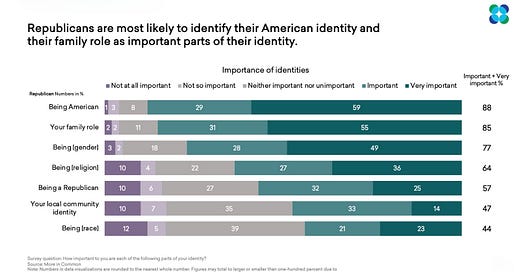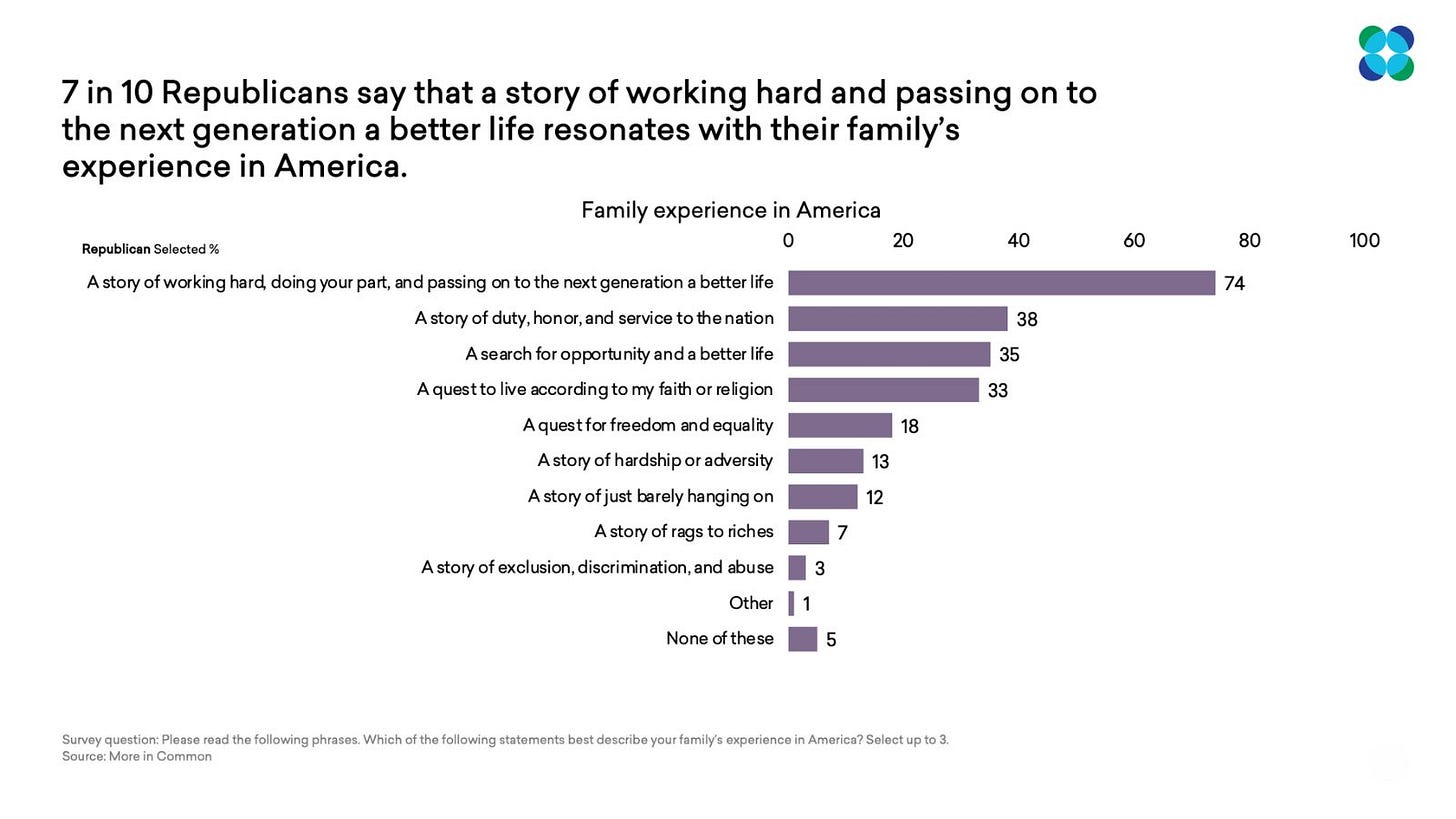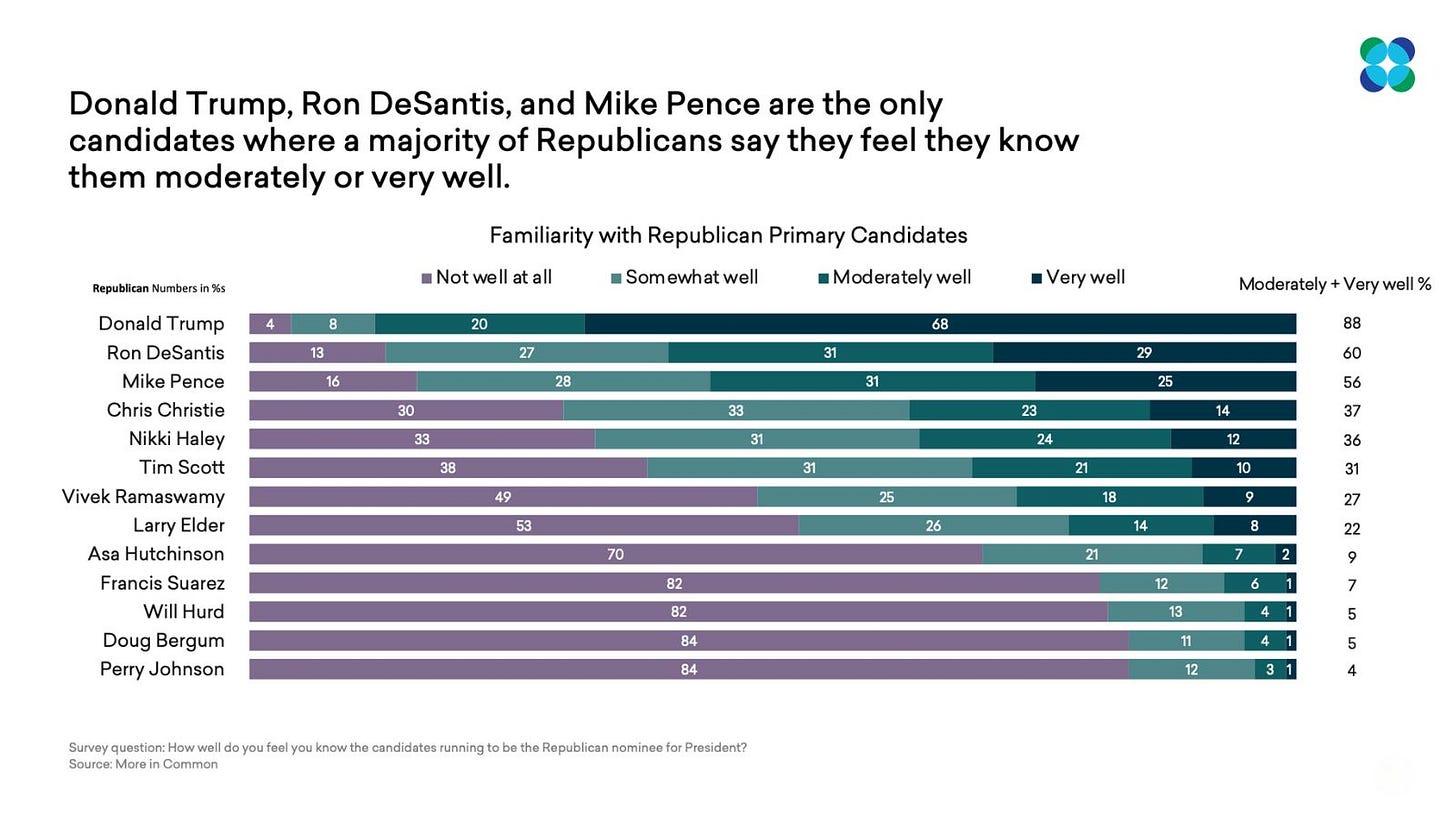What Is Important to Republican Voters?
Summary: As the Republican Party hosts its first presidential primary debate on August 23, we share insights from our latest survey Attitudes and Experiences of Republicans in America. Part One: Identity, Belonging and Priorities, focused on attitudes and experiences of registered Republican voters. We find in general there is much less appetite for culture war issues than is commonly perceived and greater support for efforts that could unite the country.
Far too often in politics, our first question of people is what candidate they support. We organize tens of millions of people into clusters that we describe with frames such as "Trump voters" or "Biden voters.” There is an obvious and important logic to this approach—knowing what candidate people support is a good predictor of how people will vote. Subsequently, many organizations interested in political outcomes operate under the assumption that how people vote and who people vote for tells us who they are and what values and priorities they embrace.
But we should be honest that this approach has significant limits, as Americans have far more rich and nuanced identities, beliefs, experiences, and attitudes than what is typically captured in traditional political polling.
Since the Republican primary battle is taking much of center stage, we decided to dig deeper than what you may see in the headlines. We asked 800 registered Republican voters not just who they plan to vote for, but about their priorities, beliefs, and attitudes around our country, future, and qualities of an ideal presidential candidate.
As we kick off the GOP primary season with the first debate on August 23, here are some of our key findings.
Republicans are more than just their political identities.
Although 74 percent of Republicans self-identify as “conservative” or “very conservative,” Republicans are much more likely to feel their American identity (88 percent), family role (85 percent), gender (77 percent) and faith identities (64 percent) are important relative to their political identity (57 percent).
Republicans are also most likely to cite a faith community (40 percent), followed by local neighborhood (31 percent), and workplace (25 percent) as “where they feel a strong sense of belonging,” compared to only 7 percent that selected “political community.”
Republicans are concerned about the state of the country, especially for future generations.
Republicans most commonly feel frustrated (79 percent), disappointed (77 percent), and disgusted (66 percent) towards America today. Most notably, they feel pessimistic for the future not necessarily for themselves, but for the next generation of Americans.
This is particularly relevant, as the story that Republicans feel most represents their family’s experience is “a story of working hard, doing your part, and passing on to the next generation a better life.”
Republicans are tired by our division and looking for a leader who can unite the country, especially in our culture wars.
Eighty percent of Republicans see our political division, compared to any other, as the deepest division in our country and are exhausted by it. Seventy-nine percent are concerned it will lead to an increase in hatred and violence.
Despite the frequent media coverage on divisive cultural issues, a majority, 61 percent of Republicans prefer a presidential candidate who will work to heal the conflicts in our culture, compared to 32 percent who will fight to win the conflicts in our culture.
A majority, 61 percent of Republicans prefer a presidential candidate who will work to heal the conflicts in our culture.
Just over half of Republicans (53 percent) said the party needs a candidate who will attract independent and undecided voters in the general election versus 38 percent said they want a candidate “who will hold true to conservative principles no matter what.”
We also see Republicans prefer a candidate that will hold true to their conservative principles.
The most commonly cited important qualities when considering who to vote for in the Republican primary are:
Is honest and ethical (65 percent)
Stands up for what they believe no matter the pressure (53 percent)
Will unite the country (50 percent)
Shares my beliefs on the issues that matter most to me (47 percent)
Is able to work with Democrats, Republicans, and Independents to solve problems (47 percent)
And when asked between choosing if they prefer a presidential candidate that will stick to their beliefs and fight versus work with people from the other side of the aisle to get things done, Republicans lean towards someone who will stick to beliefs.
Donald Trump is the preferred candidate to be the Republican nominee for president, though most other candidates are largely unknown at this point.
Fifty-three percent of Republican voters say they would vote for Donald Trump if the primary was held today, although the majority of Republican voters don’t know the other candidates well.
Conclusion
As these data points underscore, political analyses that rely on categorizing people based on the candidates they support, or relying on narrow characterizations displayed in our public arenas of what it means to be a Republican or a Democrat, are going to obscure the most salient values, beliefs, and complexities of the voters themselves. When we understand the identities that are important to Americans, especially those beyond political identities, we can identify meaningful connections across differences.
We launch this new initiative as a diverse slate of Republican candidates compete to be the nominee for president. In the coming months, we will roll out a series of reports that highlight the diversity of views and values present among Republicans. In time, we will do the same with Democrats and Independents. With all our research, we will include data on attitudes around candidates and political priorities, as these are undeniably relevant expressions of Americans' political identities, but over the course of this endeavor, we will keep our focus on the voters and their stories.
You can read the report: Attitudes and Experiences of Republicans in America. Part One: Identity, Belonging and Priorities here.
Methodology: More in Common partnered with international polling company YouGov to conduct online survey interviews with n=800 registered Republican voters from August 8-14, 2023. The respondents were matched to a sampling frame on gender, age, race, and education. The frame was constructed by stratified sampling of a subset of Republican registered voters in the 2022 Cooperative Election Study (CES) sample with selection within strata by weighted sampling with replacements (using the person weights on the public use file). The margin of error (adjusted for weighting) is +/- (3.7) for registered Republican voters and higher for subgroups.







